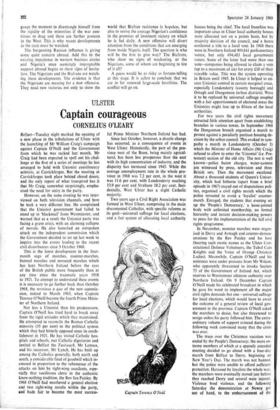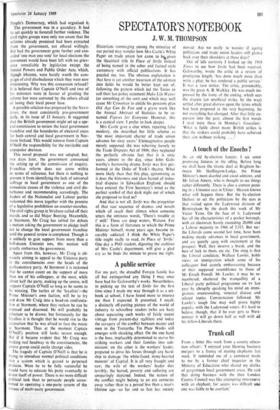Captain courageous
ULSTER CORNELIUS O'LEARY
Belfast—Tuesday night marked the opening of a new phase in the tribulations of Ulster with
the launching of Mr William Craig's campaign against Captain O'Neill and the Government from which he was sacked last month. Mr Craig had been expected to spell out his chal- lenge at the first of a series of meetings he has arranged to hold with Unionist constituency activists, at Carrickfergus. But the meeting at Carrickfergus took place behind closed doors, and the only report of what transpired has it that Mr Craig, somewhat surprisingly, empha- sised the need for unity in the party.
However, on the same evening he was inter- viewed on both television channels, and here he took a very different line. He complained that the Unionist government had failed to stand up to `blackmail' from Westminster, and warned that as a result the Unionist party was facing a grave crisis, with an alarming collapse of morale. He also launched an outspoken attack on the independent commission which the Government decided to set up last week to inquire into the events leading to the recent civil disturbances since 5 October 1968.
This is the latest development in the four- month saga of marches, counter-marches, banned marches and rerouted marches which has kept Northern Ireland before the eyes of the British public more frequently than at any time since the traumatic years 1918 to 1921. To attempt to understand these events it is necessary to go further back than October 1968, the terminus a quo of the new commis- sion, indeed to March 1963, when Captain Terence O'Neill became the fourth Prime Minis- ter of Northern Ireland.
Not less a Unionist than his predecessors, Captain O'Neill has tried hard to break away from the rigid attitudes which they maintained. He attempted to reconcile the Roman Catholic minority (35 per cent) to the political system which they had bitterly opposed since its estab- lishment in 1921. He has visited Catholic hos- pitals and schools, met Catholic dignitaries and invited to Belfast the Taoiseach, Mr Lemass, and his successor, Mr Lynch. He has built up among the Catholics generally, both north and south, a considerable fund of goodwill which in- creased in proportion to the vehemence of the attacks on him by right-wing assailants, espe- cially that vociferous cleric in the authentic know-nothing tradition, the Rev Ian Paisley. By 1968 O'Neill had weathered a general election and two right-wing revolts within the party, and bade fair to become the most success-
ful Prime Minister Northern Ireland has had.
Since last October, however, a drastic change has occurred, as a consequence of events in West Ulster. Historically, the part of the pro- vince west of the Bann, being mainly agricul- tural, has been less prosperous than the east with its high concentration of industry, and the disparity has increased since 1945. While the average unemployment rate in the whole pro- vince in 1968 was 7.2 per cent, in the west it was 11.6 per cent, with Londonderry reaching 13.9 per cent and Strabane 18.2 per cent. Inci- dentally, West Ulster has a slight Catholic majority.
Two years ago a Civil Right Association was formed in West Ulster, comprising in the main discontented Catholics, with specific reforms as its goal—universal suffrage for local elections, and a fair system of allocating local authority
Captain Terence O'Neill
houses being the chief. The local franchise was important since in Ulster local authority houses were allocated not on a points basis, but by majority decision of the council, and a house conferred a title to a local vote. In 1968 there were in Northern Ireland 909,841 parliamentary voters, but only 694,483 local government voters. Some of the latter had more than one vote—companies being allowed to claim a vote (up to a maximum of six) for every £10 of their rateable value. This was the system operating in Britain until 1945. In Ulster it helped to en- sure Unionist control in certain marginal areas, especially Londonderry (county borough) and Omagh and Dungannon (urban districts). Were it to be replaced by universal suffrage coupled with a fair apportionment of electoral areas the Unionists might lose up to fifteen of the local authorities.
For two years the civil rights movement attracted little attention apart from establishing branches in various towns. In September 1968 the Dungannon branch organised a march to protest against a peculiarly partisan housing de- cision by the urban council. This evoked in sym- pathy a march in Londonderry (October 5) which the Minister of Home Affairs (Mr Craig) refused to allow to enter the `Unionist' (i.e. Pro- testant) section of the old city. The rest is well known—police , baton charges, water-cannon jets witnessed by press, television and three British MPs. Then the movement escalated. About a thousand students of Queen's Univer- sity, which had hitherto (apart from a brief episode in 1967) stayed out of disputatious poli- tics, organised a civil rights march which the police rerouted to avoid a `loyalist' counter- march. F,nraged, the students that evening set up the `People's Democracy,' a loose-jointed body with unlimited membership, no formal hierarchy and instant decision-making powers to press for the implementation of the full civil rights programme.
In November, monster marches were Organ- ised in Derry and Armagh and counter-demon- strations by the Rev Paisley and his host (bearing such exotic names as the Ulster Con- stitutional Defence Volunteers, the Tubal Cain Knights and the Voice of Orange Christian Ladies). Meanwhile, Captain O'Neill and his ministers were under pressure from Mr Wilson, who apparently threatened to invoke. Section 75 of the Government of Ireland Act, which reserves to Westminster ultimate authority over Northern Ireland. On 9 December. Captain
O'Neill made his celebrated broadcast in which he gave his word to implement all the major civil rights demands but one—universal suffrage for local elections, which would have to await the outcome of a general review of local gov- ernment in the province. Captain O'Neill asked the marchers to desist, but also threatened to resign unless his party followed him. The extra- ordinary volume of support evinced during the following week convinced many that the crisis was over.
The truce over the Christmas vacation was ended by the People's Democracy; the more ex- treme members of which at a sparsely attended meeting decided to go ahead with a four-day march from Belfast to Derry, beginning on New Year's Day, The march was not banned.
but the police were unable to afford sufficient protection. Harassed by loyalists the whole way, the marchers were eventually stoned just before, they reached Derry and several were injured.
Violence bred violence, and the following Saturday the demonstration at Newry got out of hand, to the embarrassment of the
People's Democracy, which had organised it. The government was in a quandary. It had to act quickly to forestall further violence. The civil rights groups were only too aware that the reforms already promised had been extracted from the government, not offered willingly.
But had the government gone further and con- ceded 'one man one vote' for local elections the movement would have been left with no griev- ance remediable by legislation except the Special Powers and Public Order Acts, which, though irksome, were hardly worth the cam- paign of civil disobedience which they were now threatening. Why was this concession refused? It is believed that Captain O'Neill and two of his ministers were in favour of granting the reform but were outvoted by the others afraid of losing their local power base.
A possible solution was proposed by the News- letter, the most consistently pro-government
daily, in its issue of 13 January. It suggested that the British government might set up a spe- cial commission to review the local government franchise and the boundaries of electoral areas for both central and local government in Nor- thern Ireland. This would remove from Captain O'Neill the responsibility for the inevitable and unpopular decision.
This novel proposal was not adopted, but, two days later, the government announced the setting up of the commission of enquiry.
Franchise reform does not come within its terms of reference, but there is nothing to prevent it from identifying the lack of universal suffrage in local government as one of the immediate causes of the violence and civil dis- turbance and recommending accordingly. The leaders of the Nationalist and Labour parties welcomed this move together with the promise of a legislative prohibition on counter-marches.
The civil rights group in Strabane called off their march, and so did Major Bunting. Meanwhile, at Stormont, Mr Craig has tabled for debate
a motion asking the government to pledge itself not to change the local government franchise until the general review is completed. Though it is unlikely to gain support from more than a half-dozen Unionist MPS, this motion will greatly embarrass the government.
Apart from this, however, Mr Craig is ob- viously aiming to appeal to the Unionist party
in the constituencies over the heads of the parliamentary party. At Stormont it is reckoned that he cannot count on the support of more
than ten of his colleagues, at the most, while about half the party, making up the centre, will support Captain O'Neill so long as he seems to be winning. The tactics of the 'loyalists'—the Prime Minister's own faction, will be to try and draw Mr Craig into a head-on confronta- tion at Stormont, where they reckon he can be exposed and disarmed. He will probably be reluctant to be drawn; but fortunately for the loyalists it is thought that he would rise to the
accusation that he was afraid to face the music at Stormont. Thus at the moment Captain O'Neill's position still looks secure enough. But if it became evident that Mr Craig was making real headway in the constituencies, the centre group could easily change sides.
The tragedy of Captain O'Neill is that he is trying to introduce normal political conditions
into a system which is geared to perpetual division. Were he to be fully successful he would have to educate his party eventually to divest itself of power. There is no more difficult political task than to persuade people accus- tomed to operating a one-party system of the virtues of multi-party government.



































 Previous page
Previous page